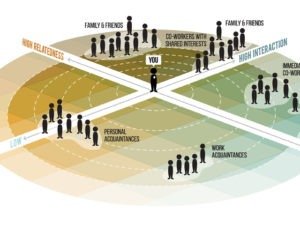Empathy at work is the key to understanding, mobilizing, and engaging the human workforce.
Empathy is the ability to put yourself in the shoes of another—to truly understand their situation and the emotions they feel as a result of it. It is not to be confused with sympathy, which is the ability to feel compassion or sorrow for others.
Emotional intelligence (also called emotional quotient or EQ) is a measure of our ability to sense and understand the emotions of others. In other words, emotional intelligence gauges our ability to both demonstrate empathy for others and understand how our actions impact them.
Empathy at work, and by extension emotional intelligence, are indispensable skills to prioritize in a workforce. Why? Because an empathetic workforce is the pretext to a great company culture, high-performing teams, and better bottom line outcomes. Empathy and emotional intelligence are the skills that help teams understand how to work together and set each other up for success. Here are five reasons why leaders and teams alike need empathy at work to perform their very best.
1. Our decisions are governed by our emotions
It may not be shocking to hear, but our emotions hold considerable sway over the decisions we make every day. While we’d like to think our decisions are governed by rational thought, the truth is humans are irrational creatures. In the tug of war between logic and emotion, the latter frequently wins out.
Consider this example provided by research from Rice Business School. When we have to make complex decisions, our instinct is often to gather information to make a more educated decision. But making the “right” choice is never so simple, and we seldom process information in stark black or white, good or bad terms. Our emotions get in the way. People in negative mindsets tend to be more focused on the research they seek out when making a high-risk decision, Rice researchers found. Upbeat decision makers, on the other hand, have a tendency to do the opposite. They’ll be less information focused, even in high-risk situations, because they feel the odds are in their favor.
We’re not going to belabor this point too much more. You’re human, and odds are you can think of more than a few situations where your emotions have influenced the decisions you’ve made. But this is why we say empathy at work is the pretext for high-performing teams. It is the essential “human” skill that helps leaders, supervisors, employees—frankly everyone—understand each other and why we do the things we do.
When we’re able to better understand the emotions of our colleagues—and how those emotions result in actions—we can make smarter decisions as a team on workflow, processes, and productivity improvements. Empathy, in essence, opens the door for innovation in our functions. There’s just one caveat.
2. There’s an empathy gap in the modern workplace
A 2018 study shows the state of empathy at work is not great. To briefly summarize its findings: CEOs feel they lead empathetic organizations, but employees don’t feel CEOs exhibit that empathy. Ninety-two percent of CEOs reported their organization is empathetic, but only 50% of employees say their CEO is empathetic.
If you’re familiar with Larry Senn’s shadow of a leader concept, you’ll understand that this issue is not just localized to the C-suite. According to Senn, the actions, attitudes, and cultural traits of the C-suite cast a long shadow over the organization. The managers and supervisors operating in that shadow come to view the behaviors of the C-suite as a template for success in the organization. They come to believe those actions should be mimicked and systemically perpetuated in order to succeed and get ahead. Unempathetic CEOs, then, effectively breed a leadership chain out of touch with the emotional needs of the workforce.
There is an upside. According to the same survey, 68% of CEOs report the state of empathy at work needs to change. This statistic rose eight percentage points from the same survey conducted a year prior, signaling a tidal shift in CEO priorities.
3. Leaders who show empathy at work inspire stronger teams
Time and again, studies show us that empathy at work has a material impact on employee performance. Leaders who demonstrate empathy at work are, frankly, the most successful in engaging their teams. In the same study we discussed in the last section, for example, 87% of CEOs saw a direct link between workplace empathy and business performance, productivity, retention, and business health.
Another study, a recent Yale survey, showed employees who rated supervisors as having high emotional intelligence felt more engaged and that their work was more meaningful. On the flip side, less emotionally intelligent leaders had employees who experience higher burnout and, critically, felt afraid to speak up about it.
Let’s linger on that last sentiment about fear in the workplace and employee feedback for just a bit longer. Per Gallup, managers account for at least 70% of the variance of employee engagement scores across business units. That makes the employee-manager relationship perhaps the most important relationship to be nurtured in a company, and empathy has a big role to play here. The imbalanced power dynamic between manager and employee means the latter is at the former’s mercy with how they engage in their work.
If a manager is unempathetic and wields fear as a leadership tool, their team’s engagement, performance, and innovation potential shrinks. Teams shift into CYA mode because they know if they express how they really feel, they’ll face retribution for it. A manager’s lack of empathy at work, then, limits the quality of feedback the company receives from employees, which in turn places an artificially low ceiling on the improvements the company can make to its processes, structure, and culture. And that’s to say nothing of the emotional toll fear in the workplace creates.
Related: 5 Emotions Show the Impact of Employee Engagement on Performance
4. The future of work demands empathetic leaders
The human element of work is growing more important as our professional lives are automated and supplemented by technology. The number of face-to-face interactions we have is declining. There are fewer reasons for teams and functions to do work in one centralized location when technology lets you take your work anywhere.
Even in the open floor plan offices designed to increase the number of face-to-face interactions, we see the opposite happen. A study by Harvard Business School shows the open floor plan in one Fortune 500 company caused face-to-face employee interactions to drop by 73%. At the same time, employee email use increased 67% and use of instant messenger tools rose by 75%.
With fewer face-to-face interactions happening in the workplace, there’s more pressure on the ones that do occur to be meaningful and impactful. Per Deloitte Insights, empathy at work will become one of the most important leadership competencies, serving as a counterbalance to an increasingly automated and tech-enhanced workplace.
“Skills such as empathy, communication, persuasion, personal service, problem-solving, and strategic decision making are more valuable than ever,” the firm writes. “While some will dramatize the negative impacts of AI, cognitive computing, and robotics, these powerful tools will also help create new jobs, boost productivity, and allow workers to focus on the human aspects of work.”
5. Empathy at work improves change readiness
Change is what will bring us our tech-enhanced future of work. If we want new bells and whistles to make our work lives easier, we have to undergo change to our workflow and processes, job functions, and even the structure of the organization itself. The expression “change is the new normal” gets repeated so much in the enterprise that it often sounds like a platitude, but the fact is, it’s the simple truth of the business landscape we operate in.
But change places an emotional toll on employees. When organizations undergo significant change efforts, employees’ sense of security is thrown into disarray. The question that invariably comes up is an understandable one: “How does this change affect me?”
If the company wants to make it through the change effort with any degree of agility, leaders need to answer this question with clear and empathetic communication. The bigger the change, the bigger the emotional response employees will have. As such, leaders need to be able to validate employees’ feelings in order to understand any resistance to the change effort and how to overcome it. By owning their part in the process, leaders can help employees get over the change curve quicker, and help them adapt for future change efforts in the process.
Of course, there are plenty more than only five reasons why businesses need more empathetic workforces. Empathy and emotional intelligence can benefit essentially all aspects of the business and ensure employees have great experiences all throughout the employee life cycle. If you think you or your colleagues could benefit from stronger displays of empathy at work, considering taking one of these free emotional intelligence training courses.



 6 min
6 min




